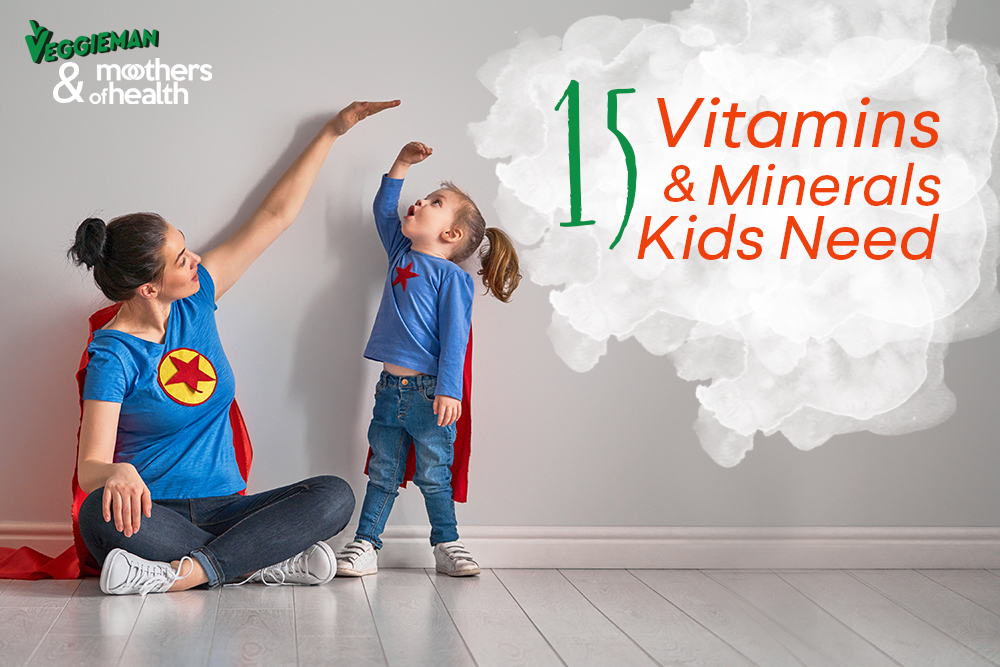
In today’s modern food culture – with highly processed and refined foods available just about everywhere you look – it has become even more important to ensure that your child gets enough vitamins and minerals to stay healthy. Join us to explore the most important vitamins and minerals for your child’s healthy development and how a deficiency can affect your their health. To learn more about our favorite foods for getting in these nutrients, check out this article here .
Children of all ages have an increased need for vitamins and minerals to support their growth for their growing bodies. Do you know what those vitamins are and how a deficiency may show up in your child’s health? The most important vitamins that growing kids need include fat-soluble vitamins A, D, E, and K and water-soluble B vitamins and vitamin C. Minerals are just as important for healthy development, including iron, calcium, magnesium, zinc, and selenium. We suggest 8-10 servings of vegetables and 2-3 servings of fruits per day for kids. A fun rule of thumb is to eat as many varied colorful food options every day as possible!
So, why are these vitamins and minerals so important for your child’s growing bodies and what should you look out for in terms of symptoms related to deficiency?
Vitamin A:
supports healthy skin, vision and eyes, normal growth and development, tissue repair, and strengthens the immune system. If your child is deficient in vitamin A, it may show up as poor vision, dry or rough skin, and frequent colds or infection.
Vitamin D
plays a role in the development of strong bones, a healthy immune system, and a stable mood. If your child doesn’t have adequate levels of vitamin D, it may lead to rickets (softening of bones), tooth decay, fatigue, or frequent colds or infections.
Vitamin E
acts as an antioxidant, which helps protect cells against damage caused by free radicals (which can cause disease). If your child doesn’t get enough vitamin E, it can lead to fatigue, muscle weakness, anemia, or slow wound healing.
Vitamin K
is important for healthy bone development and helps with blood clotting. Low vitamin K levels may lead to poor blood clotting of wounds and nose bleeds.
B Vitamins
support energy and metabolism, healthy circulation and stable mood. If your child is deficient in B vitamins, this may contribute to delayed growth, fatigue, weakness, tingling of burning in fingers or toes, lack of appetite, headaches, anemia, or depression.
Vitamin C
is important for a healthy immune system and it strengthens tissues via the production of collagen. If your child doesn’t have healthy vitamin C levels, they may experience more frequent colds, infections, allergies, easy bruising, fatigue, or anemia.
Iron
helps with building muscle, the production of red blood cells, and supports healthy energy. Low iron levels may lead to anemia, fatigue, loss of appetite, or pale skin.
Calcium
plays a role in healthy bones, teeth, and nerve and muscle function.If your child isn’t getting enough calcium, this can contribute to brittle bones, tooth decay, muscle aches, leg cramps, or impaired growth.
Magnesium
helps maintain strong bones and teeth, supports the nervous system, and reduces bed-wetting. A deficiency in magnesium can cause constipation, anxiety, fatigue, muscle twitches and cramps, seizures, headaches, irregular heartbeat, or bed-wetting.
Selenium
supports healthy immune function, acts as an antioxidant that protects cells against damage, and supports thyroid health. A deficiency in this mineral can cause fatigue, nausea, vomiting, headaches, confusion, frequent colds or infections, or seizures.
Zinc
is necessary for healthy growth and development, a healthy immune system, wound healing, skin health, and a reduction in allergies. Low zinc levels may lead to delayed sexual maturation, stunted growth, frequent colds and infections, poor wound healing, slow learning, allergies, and acne.
Manganese
is important for brain development, helps with nerve function and bone development. If your child is deficient in this mineral, it may cause slow growth and development, defects in bone formation, and blood sugar imbalances.
Potassium
supports healthy nerve function and muscle contraction, and helps regulate blood pressure. Low potassium levels can lead to fatigue, muscle weakness, or constipation.
Phosphorus
helps with the formation of bones and teeth, and supports muscle and nerve function. Deficiency may contribute to fatigue, poor appetite, anxiety, brittle bones, decreased growth, or poor bone or teeth development.
Copper
plays a role in the production of blood cells and energy, bone formation, and tissue development. Low levels of this mineral may lead to fatigue, weakness, anemia, frequent illness, brittle bones, or pale skin.
Now that you’ve learned about how important these vitamins and minerals are in your child’s growing body, we invite you to check out our kid-friendly recipes on our website so you can include more healthy foods into your family cooking!
Additional References:
Brown, J. E., & Lechtenberg, E. (2017). Nutrition through the life cycle. Cengage Learning. 6th Ed.
Sharon, Michael. (2017). The Complete Guide to Nutrients. Wellbeck Publishing Group Limited. 7th Ed.
Yakoob MY, Lo CW. Nutrition (Micronutrients) in Child Growth and Development: A Systematic Review on Current Evidence, Recommendations and Opportunities for Further Research. J Dev Behav Pediatr. 2017 Oct;38(8):665-679. doi: 10.1097/DBP.0000000000000482. PMID: 28746059.
https://www.health.harvard.edu/staying-healthy/listing_of_vitamins
https://lpi.oregonstate.edu/mic/minerals/
Check Out: The Vitamin and Mineral Content of Different Vegetables, Fruits, & Legumes










